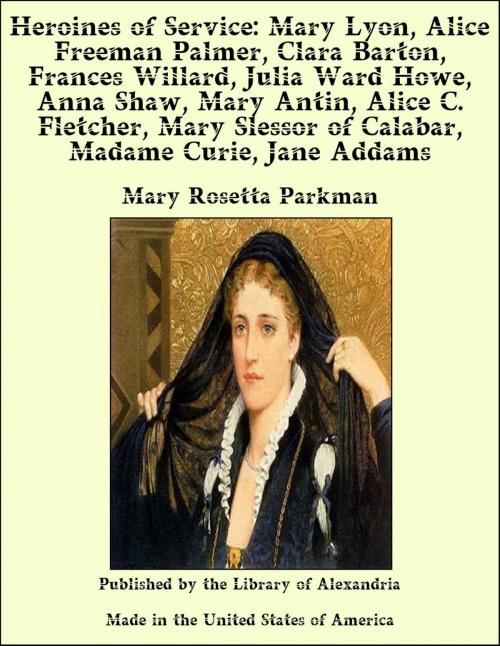Heroines of Service: Mary Lyon, Alice Freeman Palmer, Clara Barton, Frances Willard, Julia Ward Howe, Anna Shaw, Mary Antin, Alice C. Fletcher, Mary Slessor of Calabar, Madame Curie, Jane Addams
Nonfiction, Religion & Spirituality, New Age, History, Fiction & Literature| Author: | Mary Rosetta Parkman | ISBN: | 9781465575876 |
| Publisher: | Library of Alexandria | Publication: | March 8, 2015 |
| Imprint: | Language: | English |
| Author: | Mary Rosetta Parkman |
| ISBN: | 9781465575876 |
| Publisher: | Library of Alexandria |
| Publication: | March 8, 2015 |
| Imprint: | |
| Language: | English |
From time immemorial women have been content to be as those who serve. Non ministrari sed ministrare—not to be ministered unto but to minister—is not alone the motto of those who stand under the Wellesley banner, but of true women everywhere. For centuries a woman's own home had not only first claim, but full claim, on her fostering care. Her interests and sympathies—her mother love—belonged only to those of her own household. In the days when much of the labor of providing food and clothing was carried on under each roof-tree, her service was necessarily circumscribed by the home walls. Whether she was the lady of a baronial castle, or a hardy peasant who looked upon her work within doors as a rest from her heavier toil in the fields, the mother of the family was not only responsible for the care of her children and the prudent management of her housekeeping, but she had also entire charge of the manufacture of clothing, from the spinning of the flax or wool to the fashioning of the woven cloth into suitable garments. Changed days have come, however, with changed ways. The development of science and invention, which has led to industrial progress and specialization, has radically changed the woman's world of the home. The industries once carried on there are now more efficiently handled in large factories and packing-houses. The care of the house itself is undertaken by specialists in cleaning and repairing. Many women, whose energies would have been, under former conditions, inevitably monopolized by home-keeping duties, are to-day giving their strength and special gifts to social service. They are the true mothers—not only of their own little brood—but of the community and the world.
From time immemorial women have been content to be as those who serve. Non ministrari sed ministrare—not to be ministered unto but to minister—is not alone the motto of those who stand under the Wellesley banner, but of true women everywhere. For centuries a woman's own home had not only first claim, but full claim, on her fostering care. Her interests and sympathies—her mother love—belonged only to those of her own household. In the days when much of the labor of providing food and clothing was carried on under each roof-tree, her service was necessarily circumscribed by the home walls. Whether she was the lady of a baronial castle, or a hardy peasant who looked upon her work within doors as a rest from her heavier toil in the fields, the mother of the family was not only responsible for the care of her children and the prudent management of her housekeeping, but she had also entire charge of the manufacture of clothing, from the spinning of the flax or wool to the fashioning of the woven cloth into suitable garments. Changed days have come, however, with changed ways. The development of science and invention, which has led to industrial progress and specialization, has radically changed the woman's world of the home. The industries once carried on there are now more efficiently handled in large factories and packing-houses. The care of the house itself is undertaken by specialists in cleaning and repairing. Many women, whose energies would have been, under former conditions, inevitably monopolized by home-keeping duties, are to-day giving their strength and special gifts to social service. They are the true mothers—not only of their own little brood—but of the community and the world.















